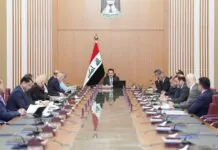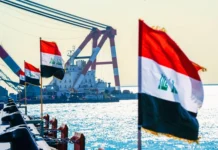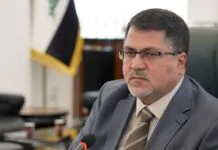Tishwash: World Bank: Iraq’s Economy to Lead Arab Region in 2026 with 6.7% Growth
According to the World Bank, Iraq’s economy is expected to record the highest growth rate among Arab countries in 2026, reaching 6.7 percent.
The World Bank said Tuesday that the strong projection marks a significant improvement compared to June 2025 forecasts. The growth is driven by energy sector recovery, increased oil exports, and government efforts to boost infrastructure investment and diversify revenue sources.
“This forecast is a positive indicator of Iraq’s economic recovery and renewal of activities amid global and regional challenges,” the report stated.
Djibouti ranked second with an expected growth of 6.1 percent, followed by Qatar (5.3%), Palestine (5.1%), and the UAE (5%). Saudi Arabia is projected to grow by 4.3 percent, while Egypt and Morocco each record 4.2 percent. Lebanon, Oman, and Libya range between 3.5 and 3.6 percent.
Algeria, Bahrain, and Kuwait are expected to post growth rates between 2.5 and 3.1 percent, while Jordan and Tunisia remain below 2.7 percent, and Yemen’s growth is projected to stay flat at 2.5 percent. link
Tishwash: Securities announces the acceptance of foreign investors to trade in the Iraqi market
The Securities Commission announced today, Tuesday, the acceptance of foreign investors to trade in the Iraqi market, while indicating that it contributed to providing a grant of four billion dinars to the Iraqi markets.
The Chairman of the Securities Commission, Faisal Lahims, told the Iraqi News Agency (INA): “The Commission has achieved influential accomplishments in the Iraqi economy, including regulating the work of unlicensed brokerage companies in trading in the financial markets outside the Iraqi Financial Authority. We have worked to correct this situation, and now we are in the process of licensing responsible companies by the Commission to undertake this task.”
He added, “The Authority has achieved accomplishments in keeping pace with the digital development in trading on the Iraqi Stock Exchange, and participating in an exchange platform with the Abu Dhabi Stock Exchange, which will introduce us to ten new markets, in addition to accepting investors from these markets to trade on the Iraqi Stock Exchange,” indicating that “the Authority was able to provide government support to the Iraqi financial markets by overcoming difficulties by developing the trading system and providing them with a grant of four billion Iraqi dinars.” link
************
Tishwash: The Iraq Development Fund signs memorandums of understanding with (4) major countries
The Iraq Development Fund announced today, Tuesday, the signing of memorandums of understanding with 4 major countries, indicating that Japan’s aid to Iraq amounts to billions due to its importance to it.
The Executive Director of the Iraq Fund for Development, Mohammed Al-Najjar, said in a statement to the Iraqi News Agency (INA): “The Iraq Fund for Development is open to all countries of the world, and we have several memoranda of understanding with a number of countries, including three memoranda of understanding with the French side, two memoranda with Britain, two memoranda with America, in addition to memoranda of understanding with Japan.”
He pointed out that “the interest in the memorandum of understanding with Japan is that they show importance in their presence in Iraq because there is billions in aid to Iraq and since the eighties they have supported Iraq and Iraq was the most important country for Japan.”
He explained that “the memoranda of understanding with Britain have been signed, and the French memoranda will be signed soon, as the memorandum includes a water project and another project to recycle sewage water and convert it into irrigation water, and this reduces the momentum for Iraq in water scarcity. As for the third memorandum, it came about the use of Shatt al-Arab water cleaning stations, and these are ready projects and will be quickly signed.” link
************
Tishwash: Al-Sudani confirms the continuation of financial and banking reform.
As part of its efforts to enhance transparency, consolidate governance, and enhance the credibility of state institutions before the international community, the government, headed by Prime Minister Mohammed Shia al-Sudani, continues to implement comprehensive reforms based on applying best financial and administrative practices, combating corruption, and ensuring compliance with laws and regulations, contributing to building a modern national economy.
In this context, the Prime Minister received a delegation from KPMG, a global auditing and financial consulting firm, yesterday, Tuesday. They reviewed existing cooperation with the Iraqi banking sector, ways to support transparency, and enhance the country’s financial reputation internationally.
Al-Sudani emphasized that banking reform has become a model of commitment and trust, praising the pivotal role of financial audit firms in consolidating governance and professionalism. He emphasized the importance of leveraging the company’s expertise in restructuring government companies and raising their operational efficiency, managing public debt, and drafting contracts for major strategic projects.
He also affirmed the government’s support for the Central Bank and the Trade Bank of Iraq to ensure the rapid completion of audit tasks in accordance with international standards and the timetable for issuing banks’ final accounts.
Regarding administrative reform, the Prime Minister chaired the 40th regular session of the Council, during which he discussed the general situation and took the necessary decisions. In light of the unified report on violations of Law No. 28 of 2019 on the Cancellation of Financial Privileges for Officials, Al-Sudani directed all government agencies to comply with the law and return any excess vehicles or protection within seven days, while referring those who refrain from doing so to the Integrity Commission to ensure the protection of public funds and promote a culture of accountability.
The Council also voted to appoint (15) general managers in various government departments, while it decided to dismiss the Director of the Investments and Contracts Department at the Ministry of Electricity and transfer him to a lower level, based on performance evaluation. These decisions reflect the government’s keenness to achieve administrative reform, enhance efficiency, and link responsibility to accountability, in line with the comprehensive objectives of the government’s program for economic and financial reform. link






